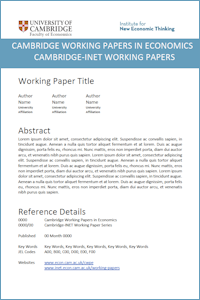
Juang, W-T. and Sabourian, H.
Rules and Mutation - A Theory of How Efficiency and Rawlsian Egalitarianism/Symmetry May Emerge
CWPE2101
Abstract: For any game, we provide a justification for why in the long-run outcomes are mostly both efficient and egalitarian/symmetric in the Rawlsian sense. We do this by constructing an adaptive dynamic framework with four features. First, agents select rules to implement actions. Second, rule selection satisfies some minimal payoff monotonicity: rules that do best are chosen with a positive probability. Third, in choosing rules agents are subject to "small" random mutation. Fourth mutation is payoff-dependent with agents mutating more when they do badly than when they do well. Our main result is: if the set of feasible rules R is sufficiently rich then outcomes that survive maximise the payoff of the player that does least well. We also show that if R is restricted to those that do best-reply on uniform histories then outcomes that survive are efficient and egalitarian amongst the set of minimum weak CURB sets. Finally, we consider long-run outcomes assuming mutation is payoff-independent; in contrast to our strong selection result above, in this case we show indeterminacy: any outcome can survive if R is sufficiently rich.
JEL Codes: C70 C72 C73
Author links: Hamid Sabourian
PDF: https://www.econ.cam.ac.uk/research-files/repec/cam/pdf/cwpe2101.pdf 
Open Access Link: https://doi.org/10.17863/CAM.65412
